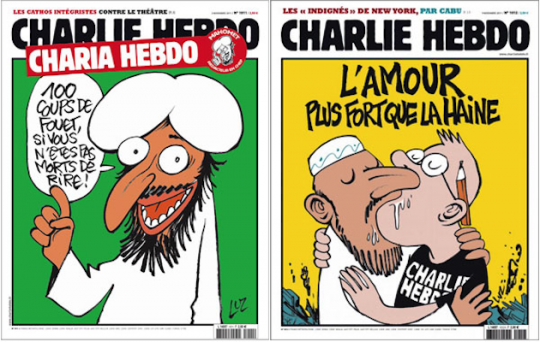It’s days like this that make you miss Christopher Hitchens. Among his qualities was a relentlessly deployed clarity on the issue of freedom of expression. It was not necessary to share his equally relentless distaste for religion to see his point. Here he is in 2006 condemning the State Department’s slimy failure to robustly defend the principle of free speech during the controversy over a Danish newspaper's publication of cartoons found by some Muslims to be "offensive":
The question of "offensiveness" is easy to decide. First: Suppose that we all agreed to comport ourselves in order to avoid offending the believers? How could we ever be sure that we had taken enough precautions? On Saturday, I appeared on CNN, which was so terrified of reprisal that it "pixilated" the very cartoons that its viewers needed to see. And this ignoble fear in Atlanta, Ga., arose because of an illustration in a small Scandinavian newspaper of which nobody had ever heard before! Is it not clear, then, that those who are determined to be "offended" will discover a provocation somewhere? We cannot possible adjust enough to please the fanatics, and it is degrading to make the attempt.
Second (and important enough to be insisted upon): Can the discussion be carried on without the threat of violence, or the automatic resort to it? When Salman Rushdie published The Satanic Verses in 1988, he did so in the hope of forwarding a discussion that was already opening in the Muslim world, between extreme Quranic literalists and those who hoped that the text could be interpreted. We know what his own reward was, and we sometimes forget that the fatwa was directed not just against him but against "all those involved in its publication," which led to the murder of the book’s Japanese translator and the near-deaths of another translator and one publisher. …
There can be no negotiation under duress or under the threat of blackmail and assassination. And civil society means that free expression might be inconvenient. It is depressing to have to restate these obvious precepts, and it is positively outrageous that the administration should have discarded them at the very first sign of a fight.
The administration in question was the Bush administration, and the situation regarding free speech has gotten much worse since then. There are plenty of examples to pick from, but just sticking with the American executive branch—which, in the lead up to the last presidential elections, identified the true culprit of the terrorist attack in Benghazi as a man who made a video insulting Muslims, and went on to condemn Charlie Hebdo a few days later for publishing cartoons mocking the Muslim prophet—made September 2012 a banner month for American cowardice.
As my colleague Sonny Bunch points out, the press has not exactly covered itself in glory in the aftermath of the attacks on the offices of Charlie Hebdo. Considering that today's attacks involved the murder of ten unarmed satirical journalists, and two police officers attempting to protect them, you might think that publications like the New York Daily News could do better than to pixelate the "offensive" cartoons at the center of the issue. As Hitchens pointed out about CNN, doesn’t the very service that the Daily News provides consist in informing its readers of what is going on in the world? The nature of the cartoons that have invited such retribution is surely a critical piece of that information.
For a time President Obama and those of his mind will be compelled by the plain awfulness of the attack to make placating noises in the direction of those who take free speech more seriously than they do (Francois Hollande, the socialist president of France, sounded like he was channeling George W. Bush this morning, saying that France was threatened "because of its liberty") but it is indeed depressing to reflect that even an attack as nasty as this is probably not enough to stiffen the West’s spine.
Even today, British newspapers seem to be leading the charge of shameful pandering. The Guardian chooses to cover the attack from the angle of explaining, in a clearly sorrowful tone, how Charlie Hebdo has "offended many Muslims" over the years, and the Financial Times went as far as to call the victims of the attack "stupid" for having been so provocative.
Things seem marginally more sensible here in the United States, but give it a few days. A lot of those talking tough today in the White House and on CNN will be back to advocating a policy of placating Islamists, in the spirit of showing tolerance and respect.
The suggestion that some fault for today’s events lies with Charlie Hebdo is not only "offensive," it is demonstrably incorrect. Islamists don’t want speech to be controlled so that everyone can be protected from offense. They don’t care one bit if Christians or Jews (especially Jews) are widely mocked in newspaper cartoons, and their occasional pretense that all they want is protection for all religions is just that, a pretense. Their aim is quite clearly not universal tolerance, but respect for the revealed truth of Islam, and ultimately Islam’s political domination. Even if Charlie Hebdo were to shut up, the Islamists wouldn’t stop what they are doing, because shutting up those who mock them is only the beginning of their demands.
Say whatever you want about how realistic the prospect of their success is. Barbarians have destroyed civilization before. In Europe, the demographics already favor those with radical Islamic aspirations. If the West’s centrist politicians can’t accept that there can be no policy of liberal compromise towards totalitarian Islamofascists—and if its journalists can’t even print a picture of a cartoon—then, given enough duress, voters will turn to more extreme options. Apparently France’s far-right National Front, led by Marine Le Pen, is doing quite well in the polls.
